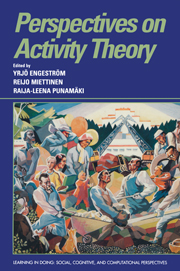Book contents
- Frontmatter
- Contents
- List of contributors
- Series foreword
- Introduction
- Part I Theoretical issues
- Part II Language and its acquisition
- Part III Play, learning, and instruction
- 14 Play and motivation
- 15 Drama games with 6-year-old children: Possibilities and limitations
- 16 Activity formation as an alternative strategy of instruction
- 17 Activity theory and history teaching
- 18 Didactic models and the problem of intertextuality and polyphony
- 19 Metaphor and learning activity
- 20 Transcending traditional school learning: Teachers' work and networks of learning
- Part IV Technology and work
- Part V Therapy and addiction
- Author index
- Subject index
18 - Didactic models and the problem of intertextuality and polyphony
Published online by Cambridge University Press: 05 June 2012
- Frontmatter
- Contents
- List of contributors
- Series foreword
- Introduction
- Part I Theoretical issues
- Part II Language and its acquisition
- Part III Play, learning, and instruction
- 14 Play and motivation
- 15 Drama games with 6-year-old children: Possibilities and limitations
- 16 Activity formation as an alternative strategy of instruction
- 17 Activity theory and history teaching
- 18 Didactic models and the problem of intertextuality and polyphony
- 19 Metaphor and learning activity
- 20 Transcending traditional school learning: Teachers' work and networks of learning
- Part IV Technology and work
- Part V Therapy and addiction
- Author index
- Subject index
Summary
Introduction
Some time ago, the psychologist Kurt Koffka made a short reference to a peculiar snatch of conversation he once overheard (Koffka, 1921, 1935). Four men were sitting at a table, and one of them – a German – was trying to prove that his native language was the best. He picked up a knife and argued as follows: “Look, the French call this ‘couteau,’ the English ‘knife’ and we Germans call it ‘Messer.’ Na, und ein ‘Messer’ ist es eben auch.” (And that's just what it is – a “Messer.”)
This anecdote has an impact only if the addressee is able to make a clear distinction between two modes of thought: functional reasoning, on the one hand, and metalinguistic reflection, on the other. In the argument put forward in the “Messer debate,” both modes of reasoning clearly conflict with one another. In the noun phrase (i.e., the topic) of the argument, the functional classification of the referent “knife” as a thing “in and for itself” is reflected, whereas in the verb phrase (i.e., the comment) the everyday reference “Messer” is discussed and evaluated. The latter appears primarily to be a thing “for us Germans.”
This reference to the sociocultural valence of the artifact called Messer indicates that it is not the functional use as such, but the actual usage and the personalization of knowledge that are discussed here. The everyday meaning (i.e., the practical value) of the object “knife” is compared by juxtaposing three different word forms.
- Type
- Chapter
- Information
- Perspectives on Activity Theory , pp. 298 - 313Publisher: Cambridge University PressPrint publication year: 1999
- 15
- Cited by



